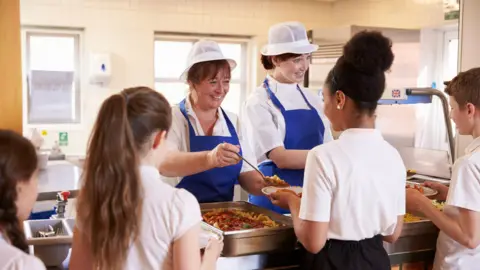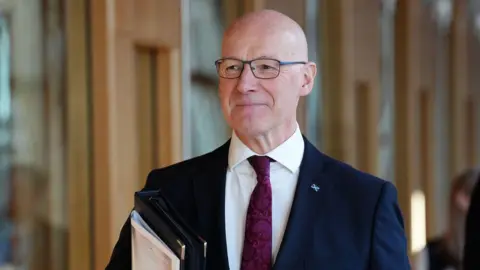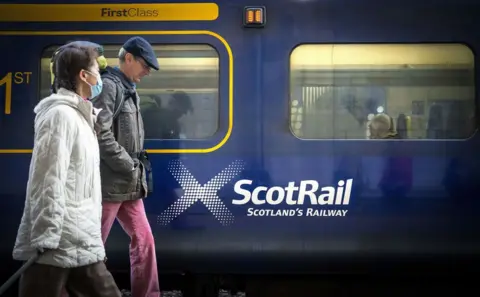Scottish government faces defeat in free school meals vote


The government previously pledged to expand the provision of free school meals
The Scottish government is expected to be defeated in a vote to expand free school meals to all primary school pupils.
First Minister John Swinney has said he would not be able to fulfil the pledge for a "universal" rollout of the benefit, and instead would expand it only to P6 and 7 pupils in receipt of the Scottish Child Payment.
The position will be challenged in a debate led by the Scottish Conservatives on Wednesday, though the government is not obliged to take action on the results.
The Scottish government said it remained "resolutely committed" to the universal expansion of free school meals in primary schools but the funding was not available due to significant financial pressures.
Free school meals are provided for all pupils in P1 to P5, but former First Minister Humza Yousaf said he wanted every primary pupil to receive the benefit last year.
The Scottish government said it would not be able to keep this commitment in its latest programme for government due to "prolonged Westminster austerity and record high inflation".
School meals per child can cost families £400 a year.
On Monday, Scottish Conservative MSP Liam Kerr submitted a motion for debate, calling on the government to give free school meals to all primary pupils this parliamentary session "as promised".
Opposition parties are expected to echo this, meaning a likely defeat for the government.

PA Media
John Swinney confirmed his programme for government last week
The Scottish Conservatives have also put forward a motion to vote on the government's decision to end a scheme that scrapped peak-time rail fares.
The pilot, which saw ticket prices subsidised by the Scottish government and standardised across the day, ended in September following "limited success".
Last month Transport Secretary Fiona Hyslop said there had been an increase in passenger levels of about 6.8% during the pilot but it would need to be 10% in order for the policy to be self-financing.
John Swinney confirmed his programme for government last week
The Scottish Conservatives have also put forward a motion to vote on the government's decision to end a scheme that scrapped peak-time rail fares.
The pilot, which saw ticket prices subsidised by the Scottish government and standardised across the day, ended in September following "limited success".
Last month Transport Secretary Fiona Hyslop said there had been an increase in passenger levels of about 6.8% during the pilot but it would need to be 10% in order for the policy to be self-financing.

PA Media
Holyrood will also face a vote on the peak rail fares pilot scheme
Children’s Commissioner Nicola Killean said the rollback on universal free school meals was a "broken promise to children" and warned that the move would only exacerbate stigma and shame around them.
Ms Killean said that going to school hungry could "severely impact development in childhood and into adulthood".
She said: "Providing access to universal school meals is vital: it helps reduce stigma and reinforces the understanding of food as a human right.
"We know that children who experience food insecurity are more likely to experience poor health, obesity and malnutrition, as well as other challenges to their physical and mental development.
“One of the greatest barriers to the take up of school meals are feelings of shame and stigma, and only providing meals to Primary 6 and 7 in receipt of the Scottish Child Payment just exacerbates that stigma."
Ms Killean went on to say she had heard stories of some children buying extra food to share with their poorer classmates, while teachers were also stepping in to help those who could not eat.
Scottish Greens education spokesman Ross Greer called the government's decision on the policy a "shameful U-turn".
He said: "The Scottish Greens fought hard to secure expansion of universal free school meals because we know how important they are for tackling child poverty and inequality.
"We were proud to secure the inclusion of all Primary 4 and 5 pupils and the commitment to include Primary 6 and 7, so we are deeply disappointed to see the SNP drop that commitment at the first opportunity."
Financial challenges
Scottish Liberal Democrat communities spokesman Willie Rennie said ministers should not make promises they cannot keep on efforts to improve child poverty.
He added: “Nicola Sturgeon, Humza Yousaf and John Swinney all committed to universal free school meals for primary pupils, but they have all failed to deliver."
A Scottish government spokesman said it had warned of financial challenges due to "prolonged Westminster austerity, the cost of living crisis and record high inflation".
He added: “That means that, whilst we remain resolutely committed to the universal expansion of free school meals in primary schools, the funding is not available for this to be completed by 2026.
“We continue to provide free school meals for nearly 278,000 pupils in primaries 1 to 5, special schools and to those eligible to S6 saving families around £400 per child per year.
"Our immediate focus is now to expand provision further to those in Primary 6 and 7 in receipt of the Scottish Child Payment, which we will deliver in this parliamentary term."
Holyrood will also face a vote on the peak rail fares pilot scheme
Children’s Commissioner Nicola Killean said the rollback on universal free school meals was a "broken promise to children" and warned that the move would only exacerbate stigma and shame around them.
Ms Killean said that going to school hungry could "severely impact development in childhood and into adulthood".
She said: "Providing access to universal school meals is vital: it helps reduce stigma and reinforces the understanding of food as a human right.
"We know that children who experience food insecurity are more likely to experience poor health, obesity and malnutrition, as well as other challenges to their physical and mental development.
“One of the greatest barriers to the take up of school meals are feelings of shame and stigma, and only providing meals to Primary 6 and 7 in receipt of the Scottish Child Payment just exacerbates that stigma."
Ms Killean went on to say she had heard stories of some children buying extra food to share with their poorer classmates, while teachers were also stepping in to help those who could not eat.
Scottish Greens education spokesman Ross Greer called the government's decision on the policy a "shameful U-turn".
He said: "The Scottish Greens fought hard to secure expansion of universal free school meals because we know how important they are for tackling child poverty and inequality.
"We were proud to secure the inclusion of all Primary 4 and 5 pupils and the commitment to include Primary 6 and 7, so we are deeply disappointed to see the SNP drop that commitment at the first opportunity."
Financial challenges
Scottish Liberal Democrat communities spokesman Willie Rennie said ministers should not make promises they cannot keep on efforts to improve child poverty.
He added: “Nicola Sturgeon, Humza Yousaf and John Swinney all committed to universal free school meals for primary pupils, but they have all failed to deliver."
A Scottish government spokesman said it had warned of financial challenges due to "prolonged Westminster austerity, the cost of living crisis and record high inflation".
He added: “That means that, whilst we remain resolutely committed to the universal expansion of free school meals in primary schools, the funding is not available for this to be completed by 2026.
“We continue to provide free school meals for nearly 278,000 pupils in primaries 1 to 5, special schools and to those eligible to S6 saving families around £400 per child per year.
"Our immediate focus is now to expand provision further to those in Primary 6 and 7 in receipt of the Scottish Child Payment, which we will deliver in this parliamentary term."
No comments:
Post a Comment